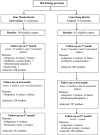Community-based father education intervention on breastfeeding practice-Results of a quasi-experimental study
- PMID: 30748110
- PMCID: PMC7199053
- DOI: 10.1111/mcn.12705
Community-based father education intervention on breastfeeding practice-Results of a quasi-experimental study
Abstract
Although the benefits of breastfeeding are well-documented, little is known about how best to encourage fathers to support breastfeeding. A quasi-experimental study of a community-based intervention was designed to examine whether health education to promote fathers' involvement in supporting women is associated with early initiation and exclusive breastfeeding practices. At baseline, 802 couples of fathers with pregnant wives from 12 to 27 weeks of gestational age were recruited to either the intervention group (n = 390) or a control group (n = 412) consisting of couples seeking care through routine maternal and child health services. Fathers in the intervention area received breastfeeding education and counselling services in health facilities and at home visits during the antenatal, delivery, and post-partum periods. Peer education and social exchange concerning breastfeeding were organized in fathers' clubs. After 1 year of the intervention, mothers in the intervention group were more likely to initiate early breastfeeding 49.2 and 35.8% in the intervention and control group respectively, P < 0.001. At 1, 4, and 6 months after birth, 34.8, 18.7, and 1.9% of the mothers in the intervention group were exclusively breastfeeding their children because of birth, respectively, compared with 5.7, 4.0, and 0.0% of those in the control group (P < 0.001). Those practices were associated with the intervention in bivariate and multivariate logistic and Cox regression analyses. Intervention targeting fathers at antenatal and postnatal periods may positively influence the breastfeeding practices of mothers, and it should be an important component of breastfeeding programs.
Keywords: Vietnam; breastfeeding; fathers' involvement.
© 2019 John Wiley & Sons Ltd.
Conflict of interest statement
The authors declare that they have no conflicts of interest.
Figures



References
-
- Ajzen, I. (1991). The theory of planned behavior. Organizational Behavior and Human Decision Processes, 50, 179–211. 10.1016/0749-5978(91)90020-T - DOI

